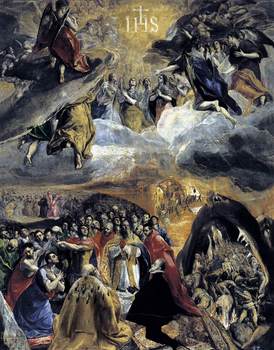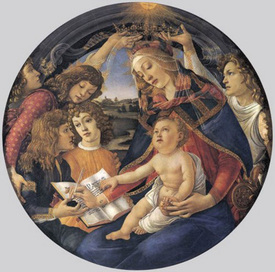Saint Bernard of Clairvaux offers a power witness to the name of Jesus. Today's feast is a good time to consider the words of Bernard as food for the soul.
I recognize now the name hinted at by Isaiah: "My servants are to be given a new name. Whoever is blessed on earth in that name will be blessed by the Lord, Amen." O blessed name, oil poured out without limit! From heaven it pours down on Judaea and from there over all the earth, so that round the whole world the Church proclaims: "Your name is oil poured out." And what an outpouring! It not only bathes the heavens and the earth, it even bedews the underworld, so that all beings in the heavens and the earth, it even bedews the underworld should bend the knee in the name of Jesus, and that every tongue should
 acclaim: "Your name is oil poured out." Take the name of Christ, take the name of Jesus; both were infused into the angels, both were poured our upon men, even upon men who rotted like animals in their own dung. Thus you became a savior both of men and beasts, so countless are your mercies, O God. How precious your name, and yet how cheap! Cheap, but the instrument of salvation. If it were not cheap it would not have been poured out for me; if it lacked saving power it would not have won me. Made a sharer in the name, I share too in its inheritance. For I am a Christian, Christ's own brother. If I am what I say, I am the heir of God, co-heir with Christ. And what wonder if the name of the Bridegroom is poured out, since he himself is pour out? For he emptied himself to assume the condition of a slave.
acclaim: "Your name is oil poured out." Take the name of Christ, take the name of Jesus; both were infused into the angels, both were poured our upon men, even upon men who rotted like animals in their own dung. Thus you became a savior both of men and beasts, so countless are your mercies, O God. How precious your name, and yet how cheap! Cheap, but the instrument of salvation. If it were not cheap it would not have been poured out for me; if it lacked saving power it would not have won me. Made a sharer in the name, I share too in its inheritance. For I am a Christian, Christ's own brother. If I am what I say, I am the heir of God, co-heir with Christ. And what wonder if the name of the Bridegroom is poured out, since he himself is pour out? For he emptied himself to assume the condition of a slave.
Did he not even say: "I am pour out like water"? The fullness of the divine life was poured out and lived on earth in bodily form, that all of us who live in this body doomed to death may receive from that fullness, and being filled with its life-giving odor say: "Your name is oil poured out." Such is what is meant by the outpouring of the name, such its manner, such its extent.
By why the symbol of oil? I have yet to explain this. In the previous sermon I had begun to do so when another matter that seemed to demand mention suddenly presented itself, though I may have dallied with it longer than I intended. In this I resembled the valiant woman, Wisdom, who put her hand to the distaff, her fingers to the spindle. Skillfully she produced from her scanty stock of wool or flax a long spool of thread, out of which she wove the material that made warm clothes for the members of her household. The likeness between oil and the name of the Bridegroom is beyond doubt, the Holy Spirit's comparison of the two is no arbitrary gesture. Unless you can persuade me otherwise, I hold that the likeness is to be found in the threefold property of oil: it gives light, it nourishes, it anoints. It feeds the flame, it nourishes the body, relieves pain: it is light, food, medicine. And is not this true too of the Bridegroom's name? When preached it gives light, when meditated it nourishes, when invoked it relieves and soothes.
How shall we explain the world-wide light of faith, swift and flaming in its progress, except by the preaching of Jesus' name? Is it not by light of this name that God has called us into his wonderful light, that irradiates our darkness and empowers us to see the light? To such as we Paul says: "You were darkness once, but now you are light in the Lord." This is the name that Paul was commanded to present before kings and pagans and the people of Israel; a name that illumined his native land as he carried it with him like a torch, preaching on all his journeys that the night is almost over, it will be daylight soon -let us give up all the things we prefer to do under cover of the dark; let us arm ourselves and appear in the light. Let us live decently as people do in the daytime. To every eye he was a lamp on its lamp-stand; to every place he brought the good news of Jesus, him crucified. What splendor radiated from that light, dazzling the eyes of the crowd, when Peter uttered the name of the strengthened the feet and ankles of the cripple, and gave light to many eyes that were spiritually blind. Did not the words shoot like a flame when he said: "In the name of Jesus Christ of Nazareth, arise and walk"? But the name of Jesus is more than light, it is also food. Do you not feel increase of strength as often as you remember it? What other name can enrich man who meditates? What can equal its power to refresh the harassed senses, to buttress the virtues, to add vigor to good and upright habits, to foster chaste affections? Every food of the mind is dry if it is not dipped in that oil; it is tasteless if not seasoned by that salt. Write what you will, I shall not relish it unless it tells of Jesus. Talk or argue about what you will, I shall not relish it if you exclude the name of Jesus. Jesus to me is honey in the mouth, music in ear, a song in the heart.
Saint Bernard of Clairvaux, Sermon 15 on the Song of Songs.




